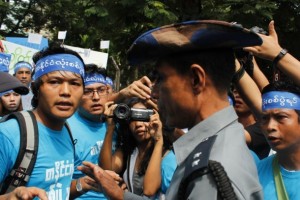Keep Human Rights on the Agenda for Burma
By Burma Partnership • October 29, 2012 This week Tomás Ojea Quintana, the Special Rapporteur on the situation of human rights in Burma, presented his latest report to the United Nations General Assembly (UNGA) that will adopt, in a few weeks, its annual resolution on the situation of human rights in the country.
This week Tomás Ojea Quintana, the Special Rapporteur on the situation of human rights in Burma, presented his latest report to the United Nations General Assembly (UNGA) that will adopt, in a few weeks, its annual resolution on the situation of human rights in the country.
Since the lifting of sanctions and the renewal of diplomatic ties with the Burma government by many foreign countries, the UNGA resolution is one of the last tools remaining in the hands of the international community to encourage the government to turn the preliminary changes of the last year into more concrete democratic reforms.
Despite recent developments in Burma, the root causes of armed conflict still haven’t been addressed and human rights violations are ongoing, serious and prevalent throughout the country.
This week, the violence in Arakan State errupted again with more than a hundred victims in a week. Meanwhile, fighting in Kachin State continues and Mr. Quintana said in his press statement, “I have received allegations of attacks against civilian populations, extrajudicial killings, sexual violence, internal displacement, torture, forced labour and portering, as well as the ongoing use of landmines and the recruitment of child soldiers, by all parties to the conflict.”
To prevent further victims and violence we join Mr. Quintana’s call for the authorities to address the underlying causes of tensions in Arakan State. Likewise, as he expressed in his report, “any durable political solution must address the root causes of the conflict and the particular concerns of ethnic minority groups.”
Freedom of assembly and association continue to be no more than a semblance; this week again a lawyer was arrested for protesting without permission. Around 300 political prisoners still remain behind bars. Violations of housing, land and property rights are widespread, as Displacement Solutions shows in a new report. The Special Rapporteur captured well the serious concerns associated with the dramatic economic development the country is likely to experience over the coming years and recommends the government to “firmly embed a human rights-based approach to economic and social development in order to ensure that the principles of participation, non-discrimination, transparency, accountability and the rule of law guide this process.” Impunity is still enshrined in the Constitution and accountability for past and current serious human rights violations hasn’t been addressed. In addition, a high number of reforms still need to take place for the rule of law to be implemented.
This is why the Special Rapporteur highlighted in his report the importance of keeping human rights on the agenda for Burma. As he said in his press statement, “The international community should also ensure that human rights considerations remain at the forefront of its engagement with [Burma] during this period of transition.”
The coming UNGA resolution must be seen as a unique opportunity to express the necessary reforms that need to take place to ensure that the current changes reach all the people of Burma. UN Member States must not shy away because of the current developments in Burma and the new prospect of investment in the country but instead must strengthen the 22nd UNGA resolution on Burma to ensure that human rights lie at “the heart of the country’s reform process.”
Tags: Burma Partnership, Freedom of Assembly, Freedom of Association, Human Rights, Riot, Rohingya, Tomas Ojea Quintana, United NationsThis post is in: Blog
Related PostsBurma Partnership Celebrates Continuing Regional Solidarity for Burma and Embraces the Work Ahead for Progressive Voice
Burma Army Displays Blatant Disregard for 21st Century Panglong Peace Process
Ann Din Coal Power Plant: Local Movement and Action to Preserve and Protect Natural Resources and Land: Mon IDP Report Case Study #4
Latest Human Rights Abuse Case Demonstrates Urgent Need to Reform the Myanmar National Human Rights Commission
Human Rights Far From Guaranteed as US Sanctions on Burma Are Removed









 All posts
All posts